
Ichi the Killer is a 2001 Japanese horror yakuza film directed by Takashi Miike, written by Sakichi Sato, and starring Tadanobu Asano and Nao Omori. Based on Hideo Yamamoto's manga series of the same name, its plot follows a psychologically damaged man who is manipulated into assaulting or killing rival faction members of feuding yakuza gangs while being pursued by a sadomasochistic enforcer.
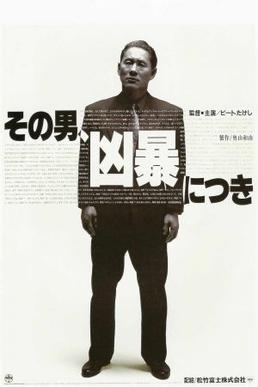
Violent Cop is a 1989 Japanese neo-noir action thriller film directed by Takeshi Kitano, written by Kitano and Hisashi Nozawa, and starring Kitano, Maiko Kawakami, Makoto Ashikawa, Hakuryu, Ken Yoshizawa, and Ittoku Kishibe. It follows Azuma, a Japanese police detective known for his rough and unprofessional conduct, after he is assigned to investigate drug trafficking by the yakuza. It was Kitano's directorial debut, and marked the beginning of his career as a filmmaker.

Last Life in the Universe is a 2003 Thai romantic crime film directed by Pen-Ek Ratanaruang. The film is notable for being trilingual; the two main characters flit from Thai to Japanese to English as their vocabulary requires. The film stars Japanese actor Tadanobu Asano and Sinitta Boonyasak.

Dead or Alive, abbreviated as DOA, is a 1999 Japanese yakuza action film directed by Takashi Miike. It stars Riki Takeuchi as the gang boss and former yakuza Ryūichi and Show Aikawa as the Japanese cop Detective Jojima and focuses on their meeting and conflict. It is the first in a loosely-connected three-part series, followed by Dead or Alive 2: Birds in 2000 and Dead or Alive: Final in 2002.

Tokyo Drifter is a 1966 yakuza film directed by Seijun Suzuki. The story follows the reformed yakuza hitman "Phoenix" Tetsu, played by Tetsuya Watari, who is forced to roam Japan while avoiding execution by rival gangs.

Into the Sun is a 2005 action film directed by Christopher Morrison and starring Steven Seagal, Matthew Davis, Takao Osawa, Eddie George, Juliette Marquis, and William Atherton.

Yakuza film is a popular film genre in Japanese cinema which focuses on the lives and dealings of yakuza, Japanese organized crime syndicates. In the silent film era, depictions of bakuto as sympathetic Robin Hood-like characters were common.

Fudoh: The New Generation is a 1996 Japanese movie directed by Takashi Miike. It is based on an unfinished manga series by Hitoshi Tanimura. Two sequels followed, neither of which were directed by Miike.

Dead or Alive 2: Birds is a 2000 Japanese film directed by Takashi Miike. Dead or Alive 2: Birds is unrelated to Dead or Alive (1999) or Dead or Alive: Final (2002) except that all three films have Show Aikawa and Riki Takeuchi in them, and they are all directed by Takashi Miike.

Graveyard of Honor is a 1975 Japanese yakuza film directed by Kinji Fukasaku. Written by Tatsuhiko Kamoi, it adapts Fujita Goro's novel of the same name. It is based on the life of real-life yakuza member Rikio Ishikawa, who is played by Tetsuya Watari. Noboru Ando, who plays Ryunosuke Nozu, was actually a yakuza member before becoming an actor.
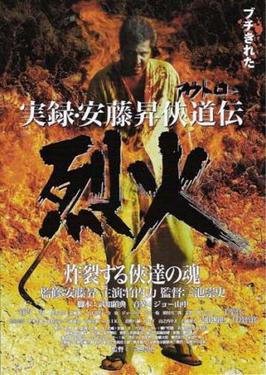
Deadly Outlaw: Rekka, also known as Violent Fire, is a 2002 Japanese yakuza film directed by Takashi Miike starring Riki Takeuchi and Sonny Chiba. Known in Japan as Jitsuroku: Andō Noboru Kyōdō-den - Rekka, it is loosely based on actor Noboru Ando's former life as a yakuza.
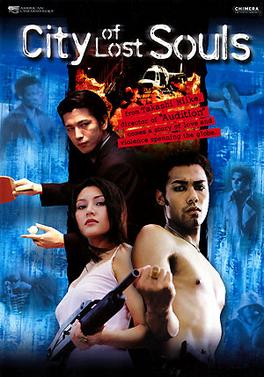
The City of Lost Souls is a 2000 Japanese action film directed by Takashi Miike based on a novel by Hase Seishu.

Shinjuku Outlaw, also known as Shinjuku Outlaws, is a 1994 Japanese video (V-cinema) directed by Takashi Miike.
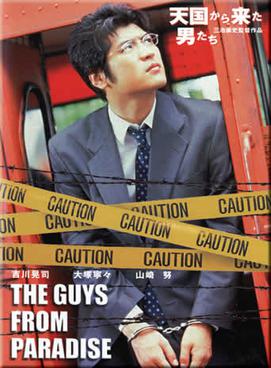
The Guys from Paradise is a 2000 Japanese film directed by Takashi Miike, adapted from the novel by Yōji Hayashi.

Yakuza Graveyard, known in Japan as Yakuza no Hakaba: Kuchinashi no Hana, is a 1976 Japanese yakuza film directed by Kinji Fukasaku. The screenplay by Kazuo Kasahara is based on a concept by Norimichi Matsudaira, Naoyuki Sugimoto and Kyo Namura.
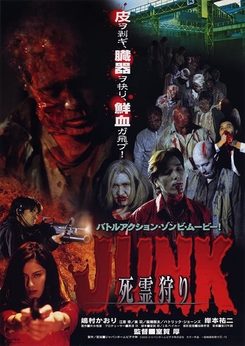
Junk is a 2000 Japanese horror film written and directed by Atsushi Muroga. A blend of the yakuza and zombie film genres, Junk stars Kaori Shimamura as Saki, a member of a group of jewel thieves. While attempting to deliver stolen goods from a heist to another criminal gang, the thieves must fight to survive against a horde of zombies resulting from secret experiments by the United States military.
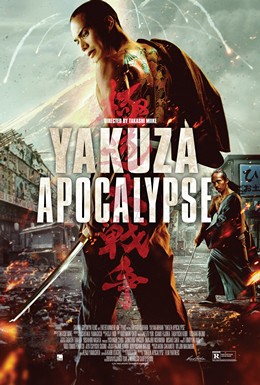
Yakuza Apocalypse is a 2015 Japanese action fantasy–yakuza vampire film directed by Takashi Miike and starring Hayato Ichihara, Yayan Ruhian, and Riko Narumi. It was written by Yoshitaka Yamaguchi. It premiered at the Cannes Film Festival on May 21, 2015, before being released theatrically on June 20 throughout Japan.
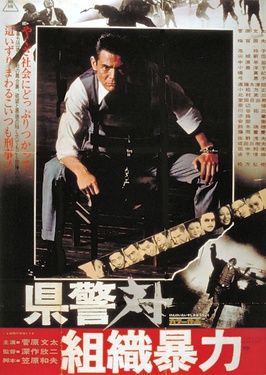
Cops vs. Thugs is a 1975 Japanese yakuza film directed by Kinji Fukasaku. It won two Blue Ribbon Awards in 1976: Best Director (Fukasaku) and Best Actor (Sugawara). Complex named it number 6 on their list of The 25 Best Yakuza Movies. Kino International released the film on DVD in North America in 2006.
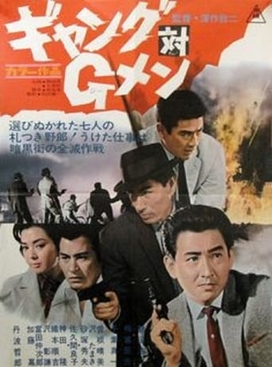
Gang vs. G-Men is a 1962 Japanese color crime thriller film directed by Kinji Fukasaku starring Kōji Tsuruta, Shinichi Chiba, and Tetsurō Tamba. In an interview with Chris Desjardins contained in the book Outlaw Masters of Japanese Film, Fukasaku called the film "the story of an ex-yakuza who becomes an undercover policeman."



















